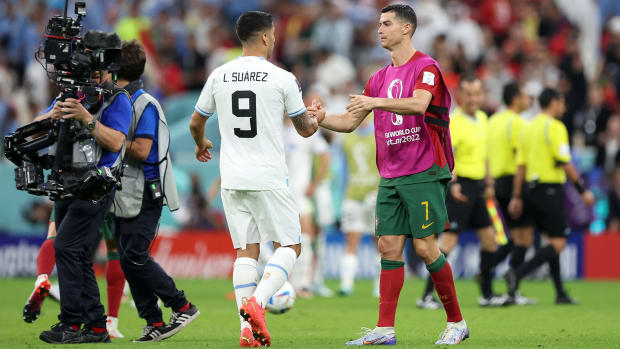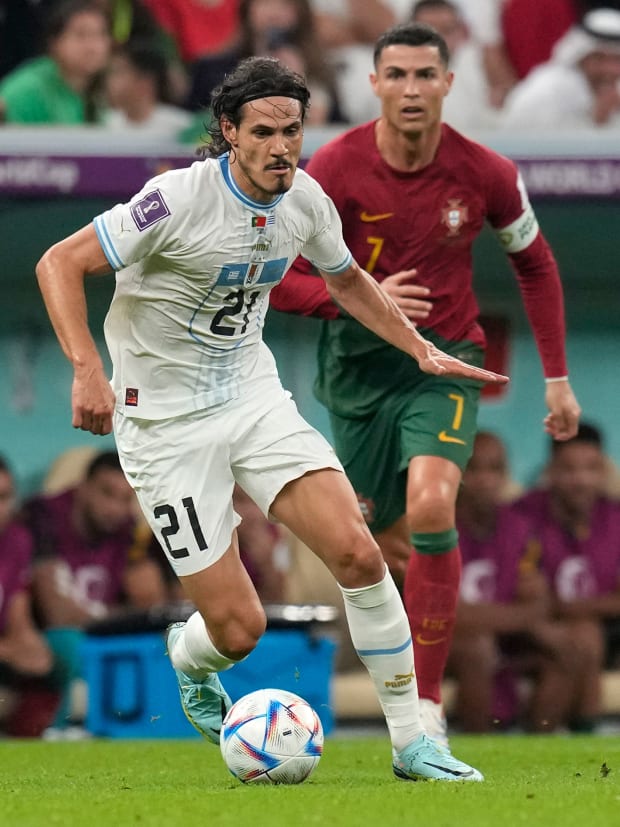LUSAIL, Qatar — It’s been a feature of this World Cup so far how old so many of the center forwards are, from Enner Valancia (33) to Robert Lewandowski (34), Olivier Giroud (36) to the new German hero Niclas Füllkrug, who became the second-oldest German outfield debutant (albeit at just 29) when he came on against Spain. There are exceptions, of course, most notably 23-year-old Kylian Mbappé—although he is not really a striker in the old-fashioned sense—but modern academies, perhaps, no longer turn out number nines in bulk.
But no countries perhaps exemplify that trend more than Portugal and Uruguay. For Portugal, the question for some time has been about whether, at 37, Cristiano Ronaldo is worth it. Yes, he brings goals, although only two non-penalty goals in eight games for Portugal this year before Monday. But he is also largely immobile these days, and there is a growing feeling that he slows the game down, to the detriment of Portugal’s fleet of younger attacking players. But Fernando Santos is an old-fashioned manager who has his way of playing that has not much changed since it resulted in a title at Euro 2016. And international football is slower than club football, more likely to be shaped by a moment of individual excellence.
“We clearly showed a very strong unit, both in the quality of the game and in the bond between them,” Santos said, following Monday’s 2–0 win that secured Portugal’s place in the round of 16. “That's how positive things are achieved.”

Piotr Kucza/Newspix/Imago Images
Uruguay’s problem is slightly different. It has not one but two aging forwards in Luis Suárez and Edinson Cavani. Now 35, they were at the core of Uruguay’s defeat of Portugal four years ago in the round of 16. Suárez started Uruguay’s opener in Qatar, a 0–0 draw against South Korea, but was barely involved, lacking the pace and thrust of old. That was in a 4-3-3 formation that left him isolated; against Portugal, manager Diego Alonso switched to a 3-4-1-2, with Cavani partnering with Darwin Núñez, who had started on the left against Korea. Neither was particularly involved, and what threat Uruguay posed came largely through the runs from deep of midfielder Rodrigo Bentancur.
With Bentancur, Matías Vecino and Federico Valverde, Uruguay has a high-class midfield, but the difficulty has been getting the balance right. To field two center forwards, an old master and Núñez, is probably what Alonso would like to do, but that leaves Uruguay potentially short in midfield. With Suárez or Cavani alone in the center, though, and Núñez consigned to the flank, there is a lack of energy and dynamism.
The back three is a solution, but that places great demands on the wingbacks, Mathías Olivera and Guillermo Varela. As against South Korea, there was a sense of Uruguay playing within itself, as it so often does. And as against South Korea there was a sense of frustration that it had not been more progressive from the start given how threatening it looked when it did try to apply pressure.
As it was, the breakthrough Monday came from Ronaldo—or it least it appeared it had initially. Against Ghana he had become the first men’s player to score in five World Cups, converting a penalty that was generously awarded after he had collapsed following a minor push. He was at it again here, collapsing to earth at any opportunity, but the Iranian referee Alireza Faghani was less easily won over than U.S. official Ismail Elfath had been.
For years, life for Ronaldo has seemed to be all about the accumulation of goals, but his quest seems to have become ever more desperate of late as he looks to set new records before time does finally run out on his career. When Bruno Fernandes crossed nine minutes into the second half, Ronaldo, played onside by Varela, threw his head at it and celebrated wildly as the ball crept in at the far post. But there was no evidence of any touch despite his celebration, and the goal was ultimately and rightly awarded to Fernandes.

Themba Hadebe/AP
With Cavani and Núñez giving way to Maxi Gómez and Suárez and the back three abandoned for a flat four, Uruguay at last began to apply concerted pressure. Gómez became the third Uruguayan to hit a post in this tournament with a smart clip from outside the box, while Suárez sliced into the side-netting and Giorgian de Arrascaeta duffed a chip into the body of Diogo Costa. It was Portugal, though, that got the game’s second goal, Fernandes tucking away a penalty—Ronaldo had already been subbed off—after another very questionable penalty decision for a handball by José María Giménez as he fell in making a challenge and had the ball hit his trailing arm.
Uruguay, for all its talent and run of form in qualifying, remains without a goal in this tournament and must beat Ghana in Friday’s rematch of the 2010 quarterfinal—the one where Suárez intentionally blocked a goal-bound shot with his hand—to have any chance of reaching the last 16. Portugal, meanwhile, is through with two wins out of two, without having fully resolved its attacking issues.







